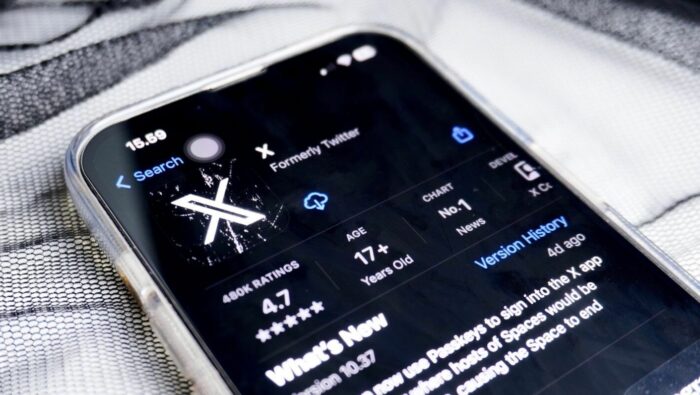
Assistant Professor Thomas Renault
Assistant Professor of Economics , University Paris 1 Panthéon-Sorbonne.
Assistant Professor of Economics at the University Paris 1 Panthéon-Sorbonne.

A team of international researchers has conducted new analysis of tweets and Community Notes on the social media platform X, exploring whether there are partisan differences in sharing misleading information online.
Key findings:
New research from the Oxford Internet Institute at Oxford University, in partnership with researchers at Panthéon-Sorbonne and the MIT Sloan School of Management, reveals partisan differences in which posts get flagged as misleading by the social media platform X’s Community Notes program.
The study’s findings show that misinformation is shared disproportionately across political divides, but this this imbalance isn’t a result of biases among the users rating the Community Notes on X.
The researchers analysed crowd-sourced assessments from X’s Community Notes program, where users on X can flag posts as misleading and write notes explaining why. These notes are then evaluated by other users, and if enough people agree on their helpfulness, they appear alongside the original post. Their analysis shows that the Community Notes program identifies twice as many misleading tweets from Republicans as from Democrats in their sample.
“Our findings provide strong evidence of a partisan asymmetry in misinformation sharing which cannot be attributed to political bias on the part of fact-checkers or academic researchers”, said Professor Mohsen Mosleh, Associate Professor of Social Data Science at the Oxford Internet Institute, part of the University of Oxford.
“Even on Elon Musk’s X, the user-based Community Notes program flags posts by Republicans as misleading much more often than posts by Democrats. This undercuts the logic offered by Musk and Mark Zuckerberg for eliminating fact-checkers on X and Meta, respectively, namely that fact-checkers are biased against Republicans”.
Examples of Community Notes included:
Original Tweet: “A candidate must win the popular vote to become President in the U.S.”
Community Note: While the popular vote reflects the total votes nationwide, the U.S. presidential election is decided by the Electoral College. A candidate can win the presidency without winning the national popular vote, as occurred in 2000 and 2016.
Original Tweet: “GTA 6 is releasing next week according to this leaked footage!”
Community Note: This video is not official and has been confirmed as fan-made content. Rockstar Games has not announced an official release date for GTA 6.
Original Tweet: (Image of a flooded city with the caption: “This is New York after yesterday’s rainstorm.”)
Community Note: This image is from a 2015 flood in Jakarta, Indonesia. It has been digitally altered and is not related to recent weather in New York.
The researchers also analysed the topics covered in Community Notes and find substantial partisan differences in the proportion of tweets rated as helpful on the Community Notes program across the different topics. Republication users were overrepresented in misinformation sharing on Health, with 81% of health-related flagged posts written by Republicans, followed by Politics, 73% Science, 68%, Other topics, 66% and the Economy, at 63%.
“Our results demonstrate that even Community Notes, where diverse groups of users have to agree in order for posts to be flagged, finds far more misleading content being posted by Republicans compared to Democrats”, said co-author Thomas Renault, Assistant Professor, University of Paris 1 Panthéon-Sorbonne.
“Our findings also indicate that Republicans will be sanctioned more than Democrats even if platforms transition from professional fact-checking to Community Notes”.
The researchers analysed a dataset of X’s Community Notes focusing specifically on “misinformed or potentially misleading” notes written in English targeting English-language tweets on X sent between January 2023 and June 2024.
Read the full paper ‘ Republicans are flagged more often than Democrats for sharing misinformation on X’s Community Notes’, Thomas Renault, Mohsen Mosleh and David G. Rand published by PNAS:
Notes for Editors
For more information and briefings, please contact: Sara Spinks / Veena McCoole, Media and Communications Manager. M: +44 (0)7551 345493 E: press@oii.ox.ac.uk
About the research
The team analyse the complete open-source dataset of Twitter’s (X’s) Community Notes, specifically examining English-language notes labelled as “misinformed or potentially misleading” that respond to English tweets posted between January 2023 and June 2024. The team infers each user’s political leaning using three distinct methods; two network-based approaches relying on users’ social connections following the methodologies proposed by Barberá 2015 (https://journals.sagepub.com/doi/abs/10.1177/0956797615594620 ) and Mosleh & Rand 2022 (https://www.nature.com/articles/s41467-022-34769-6 ) and a content-based classification using a large language model (LLM). The final dataset includes 218,382 Community Notes, covering 162,228 tweets from 39,140 unique users.
Funding information
This research was supported by HEC Foundation.
About the Oxford Internet Institute (OII)
The Oxford Internet Institute (OII) is a multidisciplinary research and teaching department of the University of Oxford, dedicated to the social science of the Internet. Drawing from many different disciplines, the OII works to understand how individual and collective behaviour online shapes our social, economic and political world. Since its founding in 2001, research from the OII has had a significant impact on policy debate, formulation and implementation around the globe, as well as a secondary impact on people’s wellbeing, safety and understanding. Drawing on many different disciplines, the OII takes a combined approach to tackling society’s big questions, with the aim of positively shaping the development of the digital world for the public good.
About the University of Oxford
Oxford University has been placed number 1 in the Times Higher Education World University Rankings for the ninth year running, and number 3 in the QS World Rankings 2024. At the heart of this success are the twin-pillars of our ground-breaking research and innovation and our distinctive educational offer. Oxford is world-famous for research and teaching excellence and home to some of the most talented people from across the globe. Our work helps the lives of millions, solving real-world problems through a huge network of partnerships and collaborations. The breadth and interdisciplinary nature of our research alongside our personalised approach to teaching sparks imaginative and inventive insights and solutions. Through its research commercialisation arm, Oxford University Innovation, Oxford is the highest university patent filer in the UK and is ranked first in the UK for university spinouts, having created more than 300 new companies since 1988. Over a third of these companies have been created in the past five years. The university is a catalyst for prosperity in Oxfordshire and the United Kingdom, contributing £15.7 billion to the UK